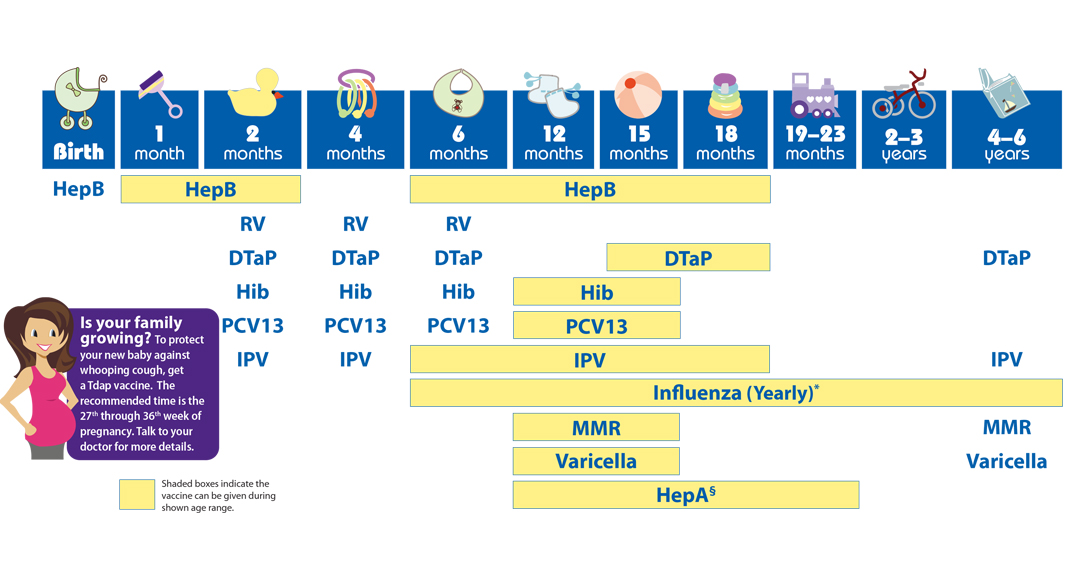 Becoming a new parent can be overwhelming and confusing. Everyone has advice, from your mom to your neighbor, and it can be difficult sorting facts from myths. One person you should definitely have on your parenting team is a pediatrician. Your baby’s pediatrician can help you wade through the sea of information that is available and help you make educated choices for your child, especially when it comes to vaccinations.
Becoming a new parent can be overwhelming and confusing. Everyone has advice, from your mom to your neighbor, and it can be difficult sorting facts from myths. One person you should definitely have on your parenting team is a pediatrician. Your baby’s pediatrician can help you wade through the sea of information that is available and help you make educated choices for your child, especially when it comes to vaccinations.
Pediatrician Dr. Nathan Boonstra is an expert on childhood vaccinations and the diseases they prevent. “The American Academy of Pediatrics recommends immunizing according to the CDC vaccine schedule,” says Dr. Boonstra. “Blank Children’s Pediatrics strongly recommends this schedule as the safest to protect against dangerous diseases.”
CDC Vaccine Schedule
With so many vaccines, it’s hard to keep track of what disease each vaccine prevents. Here’s a handy chart:
| Vaccine | Disease it prevents |
| HepB | Hepatitis B is a liver infection that can be caught in a variety of ways, including blood-involved accidents at schools and daycares. |
| RV | Rotavirus is a stomach virus that can cause severe diarrhea and dehydration. |
| DTaP | Diphtheria is an infection of the nose and throat that can cause dangerous obstruction of breathing.
Tetanus is an infection from bacteria in soil and can cause severe muscle spasms. Pertussis (Whooping Cough) is a severe, unrelenting cough that is particularly deadly to infants. |
| Hib | Haemophilus influenzae type B is a bacterial infection that causes pneumonias and ear infections and causes a particularly dangerous type of throat infection. |
| PCV13 | Pneumococcal Conjugate is a bacteria that causes a lot of pneumonia and other infections. |
| IPV | Inactivated Polio – Polio is a gastrointestinal infection that can lead to neurological problems, particularly paralysis. |
| MMR
|
Measles is one of the most contagious illnesses in the world and causes fever, cough, and rash. Complications include infection around the brain and pneumonia.
Mumps is a virus that can cause inflammation to different organs of the body, including the pancreas, gonads, and brain. Rubella is a contagious disease caused by a virus. Symptoms include fever, swollen Lymph nodes, red eyes, and full-body rash. Usually mild in children, rubella can be dangerous for pregnant women, causing serious health problems for their babies. |
| Varicella
|
Varicella (Chickenpox) was a common childhood illness that used to kill around 100 people per year in the United States, usually from pneumonia. Having chickenpox in childhood is also what causes most cases of shingles in adulthood. |
| HepA | Hepatitis A is a foodborne illness that can cause liver damage. |
Vaccine Facts
Some parents may question why most vaccines are given in a series of two or more doses. “Getting vaccines is a bit like studying for a test,” says Dr. Boonstra. “Your immune system learns how to fight off disease better if it reviews the material several times. So, we give vaccines as a series, which gives a much better immune response than just one shot.”
Thanks to vaccines, many of the diseases on the list above have either been eliminated from the country or their numbers are very low. In addition, although all of the diseases on this list can cause hospitalization and death, vaccines have helped reduce the severity of sickness if a child does get sick.
“No vaccine prevents infection 100%,” says Dr. Boonstra, “just like no seatbelt prevents automobile injuries 100%. But both keep you much safer than going without.”
If you have questions or concerns regarding your child’s vaccinations, be sure to speak to your child’s pediatrician.
 About the author: Dr. Nathan Boonstra is a general pediatrician with Blank Children’s Pediatrics who is passionate about educating families on the importance of public health and safety, with a focus on childhood immunizations. Dr. Boonstra uses social media to advocate, inform families with accurate and relevant public health information, and engage with the community to help raise awareness on important (and fun) children’s issues.
About the author: Dr. Nathan Boonstra is a general pediatrician with Blank Children’s Pediatrics who is passionate about educating families on the importance of public health and safety, with a focus on childhood immunizations. Dr. Boonstra uses social media to advocate, inform families with accurate and relevant public health information, and engage with the community to help raise awareness on important (and fun) children’s issues.
Connect with UnityPoint Health Des Moines
Website
Facebook
Twitter
YouTube
Instagram
Pinterest
This post is part of a series of sponsored posts by UnityPoint Health Des Moines.
Gift Ideas for Babies and Toddlers
Tips for High-Risk Pregnancies

















Rubella is not chicken pox. Varicella is chicken pox. They are not the same illness.
Thank you for bringing this to our attention. We have updated the information.
Rubella is not chickenpox. You might want to fix this! Makes you look less reliable as a source.
“Rubella (Chickenpox) was a common childhood illness that used to kill around 100 people per year in the United States, usually from pneumonia.:
Thank you for bringing this to our attention. We have updated the information.